This post may contain affiliate links. Please read our disclosure policy.
Age-appropriate chores for young children (and older children) are so important – with or without a chore chart! They help raise children that work hard and are not spoiled.
It’s the reason that we use these Printable Chore Cards because they teach kids that they have to do their chores in order to have downtime. they literally “swap chores for screentime.”
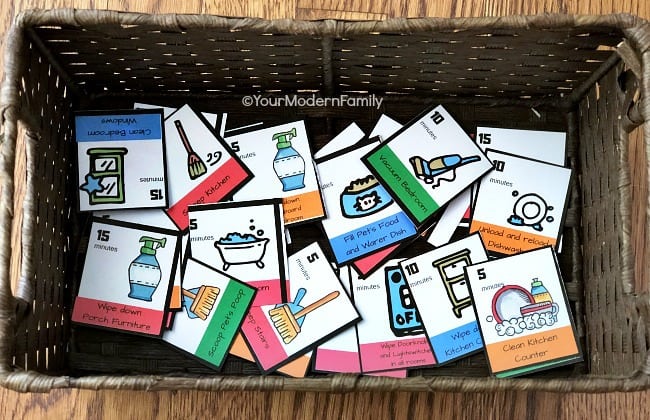
As Lythcott-Haims said: “By making them do chores — taking out the garbage, doing their own laundry — they realize I have to do the work of life in order to be part of life. It’s not just about me and what I need at this moment.
If kids aren’t doing the dishes, it means someone else is doing that for them, and so they’re absolved of not only the work but of learning that work has to be done and that each one of us must contribute for the of the whole.”
When everyone pitches in and does their part, they add their contributions to the family. It is a life skill that they will never lose (and you can teach it without using a hard-to-manage chore chart or a chores app for kids).
Kids Who Do Chores Grow Up To Be More Successful & Happier Adults
Do If you really want your kids to grow up to be successful, happy, and responsible adults? Give them chores while they are young. Science proves it’s the key!
In the longest-running study in history, the Harvard Grant study set out to determine: “DOES DOING A CHORE REALLY BENEFIT A CHILD?” The answer was yes. The study proves that kids benefit from chores.
This study started in 1938 and has continued to this day.
A study that has spanned more than 80 years has to be taken seriously, right? The researches of the study found that people need to have two things in their lives to be successful and happy as adults:
1- LOVE
2- GOOD WORK ETHIC
“And what’s the best way to develop a work ethic in young people? Based on the experiences of the 724 high-achievers who were part of the study (including people like future-President Kennedy and Ben Bradlee, the Watergate-era editor of The Washington Post) there’s a consensus.
A “pitch-in” mindset
“[The study] found that professional success in life, which is what we want for our kids … comes from having done chores as a kid,” says Julie Lythcott-Haims, in her 20XX TED talk.
“The earlier you started, the better,” Lythcott-Haims continued. (You can see her whole TED talk here.) “[A] roll-up-your-sleeves- and-pitch-in mindset, a mindset that says, there’s some unpleasant work, someone’s got to do it, it might as well be me … that that’s what gets you ahead in the workplace.” -Bill Murphy Jr, Inc.com
The High-Achievers all had a “pitch-in” mindset
The best way to teach children to have a good work ethic is to teach them to do chores, and expect that they complete them well.
A research team at the University of Minnesota completed a 20-year span. They were looking for the best predictor of adult success.
Their result? They found that if they had begun doing chores at an early age… as young as 3 or 4, they were the most successful. Those children had learned about work ethic at a young age.
It’s never too late to start.
Children need responsibility! They want responsibility! These Age-Appropriate chores for kids by age are great because they are teaching responsibility & hard work. It’s a win-win.
While I gave up on a chore chart for kids, I found a solution that is so much better – “swap chores for screentime cards.”
Why Do Kids Need To Help Out by Doing A chore (or several)?
- They help kids feel needed.
- They give them a feeling of importance.
- They help children learn responsibility
- They teach independence.
- They create a work ethic in our children that will help build that character that we want them to have.
- It helps to cut back on entitlement.
- Family chores help kids learn to work together.
- Children learn to help out the family, leaving more time to PLAY as a family. If your children learn to help now, you will have children that will be able to work later, allowing them the ability to work hard and keep a job or work hard to keep their marriage strong.
As hard as it is, do not do everything for your children! Let them do what they can. Remember the quote: fish for me & feed me for a day…. teach me to fish & feed me for a lifetime.
Children need to be taught how to do the chore first.
Before I begin with our list of age-appropriate chores for children, you need to know that your children were not born knowing how to do these tasks. You must walk them through it, teach them how you want it done.
Young children will be watching you in order to learn how to do the tasks correctly, but your older children may attempt it on their own.
I always suggest walking them through the household tasks before expecting them to do it well on their own. Do this with each chore until you have gone through them all (just do one or two a day).
Do I need a Chore Chart?
I gave up on chore charts a long time ago. Why? It is because I found chore charts for kids were more work than they were helpful. I had tried chore apps that let kids earn points, we tried a chore pad, we tried assigning chores by days of the week, etc…
When we were using a chore chart, I felt like I was constantly trying to keep rotating them, etc… I had tried finding great ideas on blog posts and in books, but nothing seemed to be what I was looking for.
Finally, one day I tossed our chore chart, chore chart templates, chore chart printable, and chore chart ideas.
I made these chore cards instead and I’ll never go back to another chore chart again. The Chore Cards that we made were my best idea to date (I hope that doesn’t sound braggy… it’ just works so well!) and I’ve NEVER looked back.
How do the chore cards work better than a chore chart?
Our kids do a chore (or several) in exchange for screentime (and even if you don’t use the screen-time part, the chore cards alone are a life-changer!) The jobs listed on the card are household tasks or outdoor tasks that need to be done.
NOTE: In our house, if they do not want screen time, they still need to help out. They can use their screen time minutes for something else (whatever you decide). The Swap Chore for Screen Time Cards have been a game-changer.
How do the Cards work in place of a chore chart?
The cards are cut up and placed in a basket or jar. It is literally the easiest set-up because I didn’t want to add any more confusing systems to the mix.
The basket or jar is then placed somewhere so the kids can easily reach it (we keep ours in the pantry). When it is time to help out, they grab the basket themselves & bring it to the table. They close their eyes, reach in, and pick from the basket. It is such a simple way to give out children’s chores & to maintain a routine.
Chore Amount for each age group:
This is split into different kid chores by age
- The 3 and 4-year-old will pick out one chore.
- A 5-6-year-old will pick out two cards
- A 7-8-year-old would pick out two to three cards
- Ages 9 & above get three cards from the basket & a few more difficult ones
Chore Ideas for tween & teens: Age Appropriate Chore List for 9 years to 12 years
I have our older sons pick several chore cards, as they are much older. You can also keep a basket for their chore cards, separate from the younger children.
I often hear these questions
- Do you have a chore list that 12-Year-old can follow?
- Do you have a chore list for what a 13-year-old be doing?
- What tasks and jobs should a 14-year-old be doing?
My Answer: Pretty much any chore, as long as they are responsible enough to do it safely. At this age, a child can handle doing the more difficult tasks and they deserve the confidence from you to try. Be sure to give them rules and show them exactly how to do it.
CHORE IDEAS:
- Cleaning the garage
- Being assigned a bathroom to take care of
- Clean & detail vehicles inside & out
- Mowing the lawn (to be honest, our sons love to cut the grass)
- Clean glass items that may be too fragile for younger children
- Take the dog on a walk
- Scrubbing windows or floors
- Washing the car
- Yardwork
- Ironing Clothes
- Cooking breakfast, making lunch, helping with dinner
- Setting the table without being reminded.
- Help a younger sibling with something.
- Babysitting a younger sibling.
- Changing their sheets
- Washing (or at least folding) laundry
- Do something to help you while they are learning the important skills to become an adult. (Example: making the grocery list for the week in order to learn to budget & plan.)
Does the Daily Responsibility Count as a Chore for Kids?
In our house, our kids have daily responsibilities that are not “a chore”.
Examples of responsibilities include:
- Make bed
- Clean up after eating
- Put dirty clothes in the hamper
- Put clean clothes away
- Unload the dishwasher as a team
- Get dressed and brush your teeth without being asked.
- Keep your shoes in the shoe basket.
Then, they have extra chores that they can pick from the basket to earn Screen Time.
How Often Should Kids Do A Chore?
In our house, the kids’ responsibilities occur daily. They use these charts to keep up with them. After using these responsibility charts every day, the kids memorize their responsibilities pretty quickly and they become a habit.
These are separate from their “swap for screentime” jobs. These are more like habits that have to be done on a daily basis.
If our kids want screentime, they will also have to find the time to do the task on the card to earn the screentime minutes.
This usually means that our kids are doing extra tasks to earn screentime daily (even if they save time for the weekend)
You can pick how often they do their chore(s):
Daily chore cards or weekends only? Maybe you choose for your children to or maybe they get more in the summer when they are out of school, etc…
You need to do whatever fits with you, your schedule & what you want for your family.
Daily Responsibilities Not Included
Remember, as I stated above there are many things that are considered to be daily responsibilities. These are expected to be completed without reminding them or asking them to do them.
Examples include:
- “Make your bed”
- “Clean your room”
- “empty the dishwasher”
They are daily responsibilities. They are not on the below list, because they are habits. We do them daily & they just help to keep the house running smoothly.
Printable Chore Chart by Age:
Age grouping for chore ideas lets your child succeed at their specific task because it is based on their development. You’re welcome to use this chore list for kids (free printable) as a jumping-off point to find good chores for kids.
This chore chart by age is simply to let you see some examples of the chore or jobs that your children are capable of, with a little practice and a demonstration by you.
You are welcome to print this Chore Chart template for kids. Just click here to send me your information & I will e-mail you the free chore chart pdf with the best chores for kids by age.
Kids Chore Examples:
- Clean the shutters behind the kitchen table (their food gets on these from their sticky hands!) 🙂
- Clean out everything UNDER your bed.
- Take sheets off of the bed (for younger kids) weekly
- Take sheets off and replace them with clean sheets (older kids) weekly
- Do your laundry (older kids)
- Take your dirty clothes to the laundry room (younger kids)
- Wipe bathroom sink and vanity in the main bathroom & their bathroom.
- Clear & clean the table after dinner
- Sweep hallway upstairs with broom & dustpan
- Put away ALL shoes in the garage by the door (we have 3 spots for shoes – they each have their own baskets at these places, so it’s easy to do & takes a second to put them away)
- Clean the outside of the toilet (bottom too) in those same bathrooms.
- Sweep the kitchen floors
- Sweep the hallway upstairs
- Clean out the van (bring in all garbage, coats, shoes…) – I do this same chore on 3 cards, so they could even both get them & do it together. It’s a big job.
- Empty all garbage in the bathrooms and their bedroom into one big garbage bag (getting garbage from all cans)
- Bring the garbage can up from the street after the garbage truck comes (it might be heavy to take it down while it is filled, but even our four-year-old can bring it up for us when it is empty… and we have a steep driveway).
- Clean the steps with a broom and then a damp rag (wooden steps). If you have carpet- have them use a damp sponge to get the dirt or pet hair if you have a pet. Have them use a small vacuum if you have one (the tiny kind for steps & small areas)
- Pick up everything on the pantry floor to keep the pantry organized (Some of our organized art supplies are in there, so coloring books and crayons end up on the floors if we don’t stay on top of cleaning it.)
- Sweep the front porch
- Sweep the back porch
- Dust furniture in the room that mom or dad pick (they use a sock on their hands)
- Pick up toys (even if you didn’t make the mess!)
- Organize the mudroom bench (see make a mudroom bench to see how we made it) – they hang up coats, put shoes in the right baskets, hang up their backpacks under the correct name…
I made this chart for you.
Age Appropriate Chore Ideas for young children
We often find that younger kids’ tasks and chores are a little difficult, due to a lack of development in certain skills. However, they can still help out around the house. Here is some information that may help:
For a 3-year-old… When our 3-year old would pull out a chore card, but I would make up one since he couldn’t read it. I would say something like “Please pick up the blankets and pillows that are on the floor, and put them away.” or “Can you put the ice cream away after I scoop it for dessert?” Something easy and safe that he can do without help.
Remember, children want to feel like they are contributing to the family. They like to feel like they have helped to keep everything going. They also learn quickly that if they help out, everyone has more time to play and relax together.
I hope that helped you to create some ideas for jobs for your kids. 🙂 I would LOVE to hear what jobs you have your children helping within your home! I am always revisiting our cards and editing them to their ages.
Print The Chore List
Click on the image below to print this list (below) for kids, and I will e-mail you this free chart/list. ☺️
Similar Studies and Articles:
I know that it is as much work to get your kids to help you as it is to just do it yourself, but I want to encourage you to read this post – STOP doing that for your kids. Try to remember that you are raising adults.
Here is the reward system that we use with our kids- it works wonders!
Here is the way that we teach our kids to clean their rooms… without reminding them!
Are your kids using electronics more & helping out LESS?
It is time to try something new (and I promise this works): Swap a Chore for Screen Time.
Plus, you no longer have to feel guilty AT ALL about allowing your kids to have some screen-time… they are earning their downtime.
- Learn why we gave up on Chore Charts and opted for the Chore Cards instead.
- No Screen Time Until (free printable)
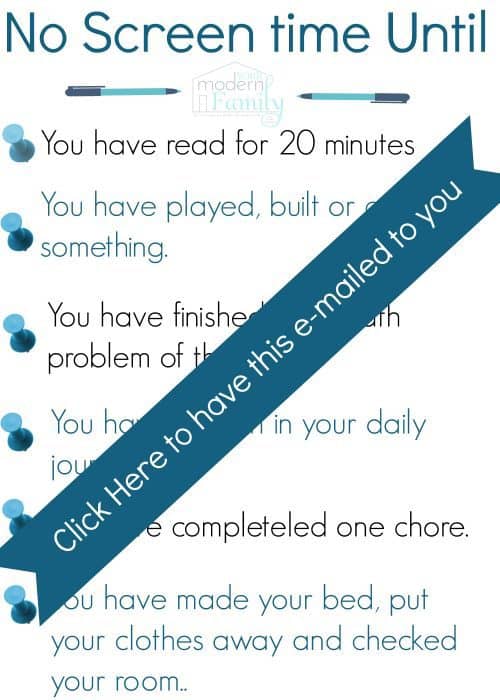

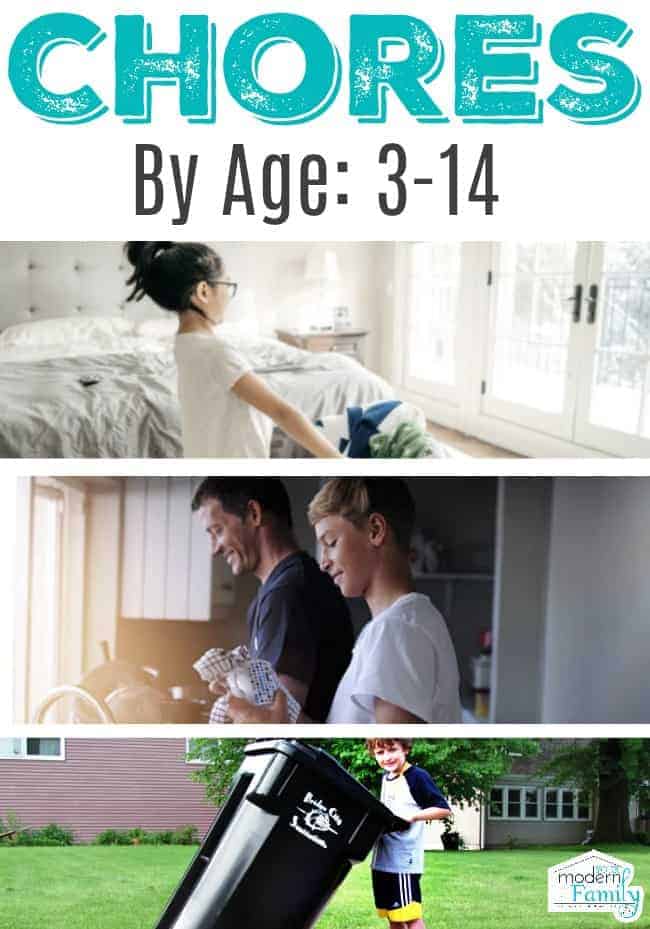

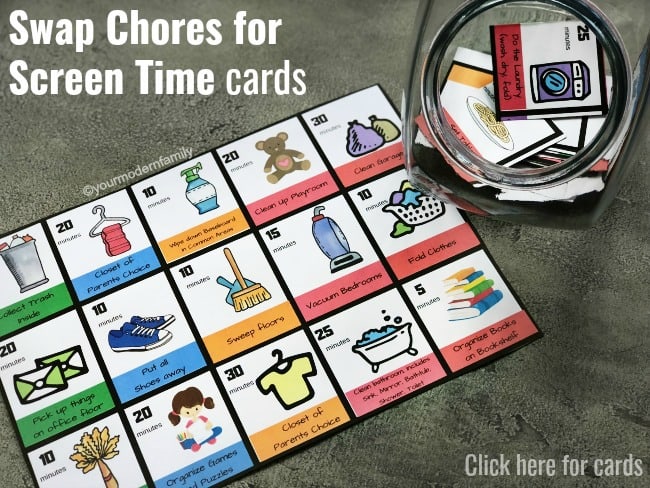
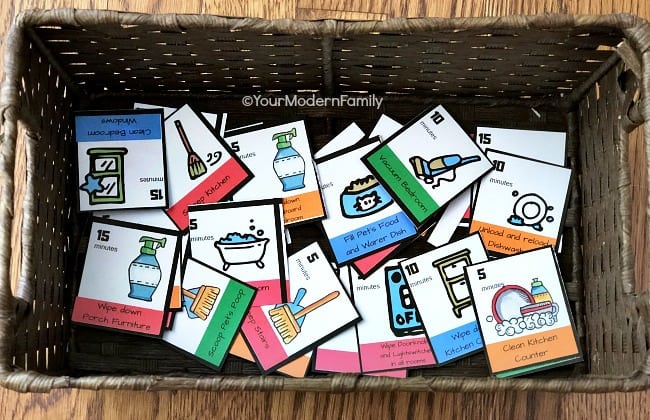
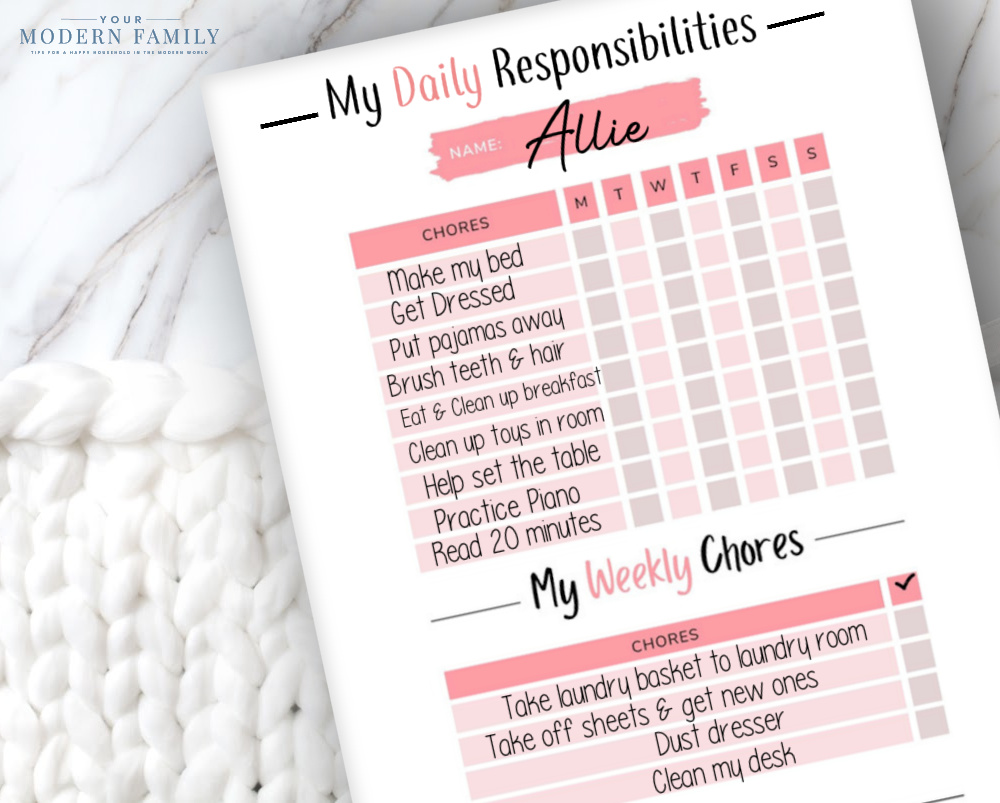

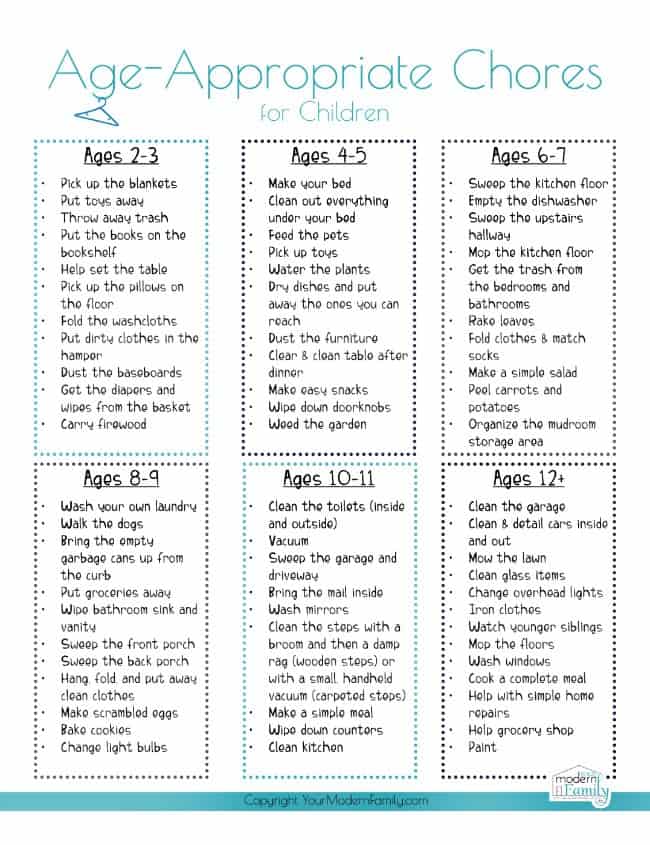
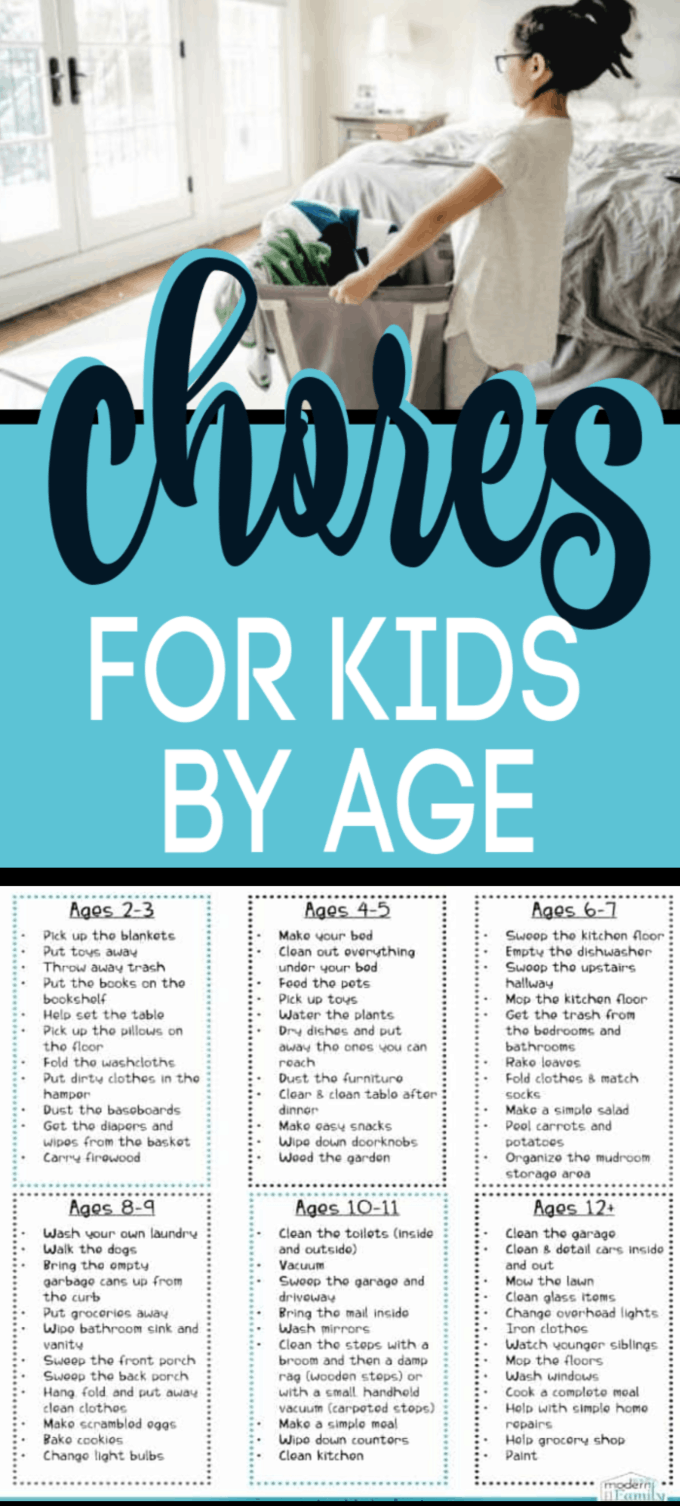














I absolutely love the reward jar idea, gives them something to visualize their progress for the week! The chart is amazing and the difference between habits and chores is a great distinction. Thank you!
Thanks for the great information. Stridepost knows that kids chores teach responsibility and skills needed for a lifetime of success. This fantastic app provides motivation and rewards, is easy to set-up and has so many great cool features that both parents and kids love to use. It can be downloaded on the App Store or iTunes!
I’ve tried something similar to this in the past but the cards would be taken out of the basket and then the kids would pocket them or lose them. At one point (I was in the hospital with my twins) the cards were scattered throughout the house and I never did find them all. What do you do to keep the cards there? Is there a pile/bag/bowl that you put them in after they have selected them?
I really appreciate and respect you for doing this! My little girl is only 5 months old, so right now I can just hope that she will be taking care of herself and will be as organized as her mommy. But girls usually are.
Why I appreciate your perspective, though, is because lately, I have been seeing a lot of undisciplined kids, whether they’re my friends’ kids or some relatives’ kids. I believe that you should spoil your kid and offer him all the necessaries, up until he is being disrespectful not only to you but to others he is getting in contact with. And I think that some little chores not only help you but help them in developing their skills and in developing a beautiful personality which will always be appreciated in society.
So congratulations to you! I hope I will be able to do the same once my little girl grows bigger 🙂
Hello,
In fact, my younger children are more motivated and seem to enjoy “helping” Mommy more often than my older children…
Thanks
thank you for such a motivational blog. I am curious about the timing of your chores, most of the things on the list seem quite consuming and I cannot imagine the kids doing them during the week. So how do you set that up and manage it please? Thank you
We are big on setting high expectations for our children. They LOOOVE it and thrive on it. Our 3 year old puts her own laundry away, feeds the dog, helps unload the dishwasher, and cleans up her own toys/books. I think it is so key to teach them responsibility young. She always offers to help with more as well. I love moving away from chore charts, and just having the expectation that everyone help out whenever needed.
Great post! I love the idea of cards and swapping for screen tiMe, but what I’m struggling with is this; how do you enforce the daily responsibilities? I’m starting to sound like a broken record, and it’s so easy to ignore these. What motivates them to do it? What works in your house?
I just use the “if- then” for daily responsibilities. If your bed is made, then you can play/watch a show/have a snack (whatever it may be). If it isn’t done, they just don’t have any privileges until it is done. Once you enforce it a few times, you’ll no longer have to say it. Our kids just know that if the bed isn’t made, they’ve lost TV for the day, snacks for the day & playing with friends for the day. It’s just not worth it for them. That one minute of doing their part is easier than having no privileges that day. If clothes are on the floor, dishes are left on the table, etc… same thing. I am kind & empathetic about it. I truly do feel bad that they made that choice because it wasn’t a good choice for them, but they made it, not me. They decided to forgo those things & I’m just the enforcer. (However… like I said, in a few days they just do it & they don’t even think about it anymore. It becomes as routine as brushing your teeth when you wake up.)
I’m so happy to see so many positive responses here! I was reading an article that contained a similar chart from a Montessori kindergarten and the comments were packed with concerned parents who claimed they didn’t want their kids to be “slaves”. I’m so glad to see there are much more reasonable parents here.
I love the chore cards! I did something similar with my daughter when she was younger. It stuck about as well as a chart, but was fun for a bit 🙂 Now that she is 14 and enjoys her independence, I’ve removed any chore tracking also. I tell her she is old enough to see when things need done as well as I do. If she chooses to help out on her own, she gets to pick her own chores and maintain her free time. If she chooses to ignore helping around the house, then she finds a list of assigned chores on our communication board and she’s subject to doing the chores I would rather not do and she’s stuck at home until they get done. Now that summer is here, it will be interesting to see how this continues!
I LOVE how you alter your expectations for her as she grows up and you also show how you respect her independence! Great work mama!
Thank you for those helpful tips. I agree that tasks must be appropriate for a kid’s age. They will enjoy and learn from it.
I am glad I found this list for 10 and 11 year olds I have to get on it because my son needs to be having more responsibility for things than he does.
Great ideas to prevent boredom in kids these days when we’re quarantined 🙂 Thanks for sharing!
When it comes to parenting, parents have different strategies. You have a great idea here and it really works. Giving or assigning your kids with chores will really help them to become responsible.
My 3 yr old just screams about everything and my 9 yr old would rather drag his feet so long, anything turns into a day long project. I have a 1 yr old as well, but hes not old enough, so, lol, what would you suggest to motivate other than tv? ( I’ve tried and they went to sleep instead. They dont really care for the tv, sweets, or money)